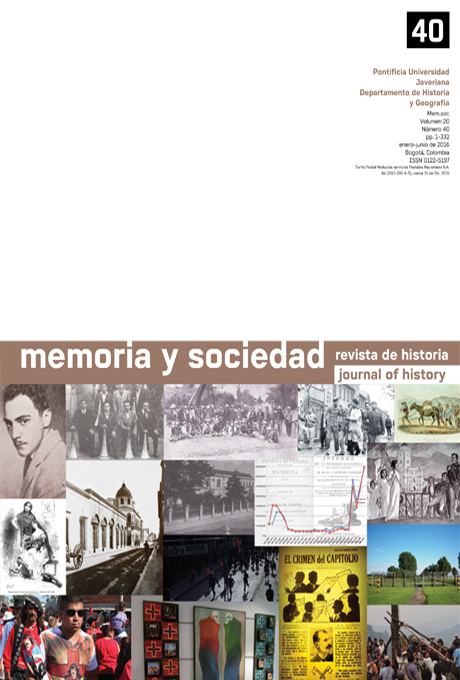Resumo
O objetivo do artigo é mostrar a representação
que as autoridades tanto civis como militares
da província de Popayán construíram sobre as
mulheres que participaram abertamente na esfera
pública, mostrando simpatia pelo bando
rebelde. Tomar-se-á o caso dos meses posteriores
à finalização da guerra civil dos Supremos
(julho de 1841 a frente), período caracterizado
pela repressão que os representantes do Estado
fizeram contra os indivíduos que participaram
abertamente na rebelião. Nesse contexto,
diversas mulheres foram expulsas da cidade, do
povoado ou da província, sim que fossem derrotadas
em tribunal, considerando que com
esses atos de sedição e simpatia para com os
rebeldes eram corruptoras e desmoralizadoras
do corpo social.
A revista Memoria y Sociedad encontra-se registada sob a licencia Creative Commons Versão 4.0 Internacional. Portanto, esta obra pode se reproduzir, distribuir e comunicar publicamente em formato digital, sempre que dado o crédito apropriado para os autores e a Pontificia Universidad Javeriana. Permite-se citar, adaptar, remixar, transformar, autoarquivar, republicar e criar a partir do material, para qualquer fim, mesmo que comercial, sempre que indicado apropriadamente o nome do criador, provido um link para a obra original e indicado se mudanças foram feitas. A Pontificia Universidad Javeriana não retém os direitos sobre as obras publicadas e os conteúdos são responsabilidade exclusiva dos autores, os quais conservam seus direitos morais, intelectuais, de privacidade e publicidade.
O aval sobre a intervenção da obra (revisão, correção, edição, tradução, formatação) e a subsequente difusão disponibiliza-se através de licença de uso e não através de transmissão de direitos, o que representa que a revista e a Pontificia Universidad Javeriana são isentas de qualquer responsabilidade que puder se derivar de uma prática ética pobre por parte dos autores. Em consequência da proteção fornecida pela licença de uso, a revista não fica na obrigação de publicar retratações ou alterar informações já publicadas, a não ser que a errata seja decorrente do processo de gestão editorial. A publicação de conteúdos nesta revista não representa royalties para os contribuintes.

